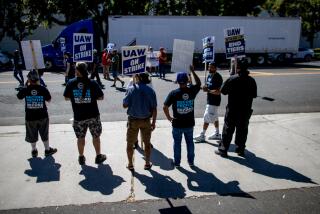Democracy and Unions Go Together
- Share via
In Iraq, we are now in the hard part: creating a viable society from the ashes of a murderous totalitarian regime.
Each day we learn again that the Iraqi people are deeply divided, and that the divisions of wealth, religion and history can carry deadly consequences. They understandably fear continued exploitation by former rulers and by those who come to power in the path of an invading army. These fearful, long-misused people’s ultimate acceptance of the United States’ good faith is crucial to democratic nation-building.
The task is daunting, but history and common sense tell us that it can be made easier by a policy that encourages the creation and support of democratic, independent trade unions.
Since World War II, unions have been a barometer of liberty. Totalitarian regimes have not permitted strikes, collective bargaining or independent worker organizations. This was true of Nazi Germany, the Soviet Union and pre-liberation Iraq, which installed a Baath Party-controlled labor federation that had no rights and no rivals.
Whenever democratic societies have arisen, however, trade unions have been part of the process. When Gen. Douglas MacArthur was given the task of creating a democratic system in Japan after centuries of imperial rule, one of the first things he did was encourage the creation of independent labor unions. To achieve this goal he incorporated the U.S. National Labor Relations Act verbatim into Japanese law. Unions in both nations remain a key element in the stable fabric of society.
The Allies also stimulated the revitalization of an independent labor movement in Germany. Poland’s Solidarity trade unions, with strong support from the American labor movement, played a key role in hastening the end of communism and in developing democratic institutions to replace it. In his autobiography, Nelson Mandela describes the continuing vital contributions of the Congress of South African Trade Unions to the struggle against tyranny and apartheid.
There are many reasons why dictators hate unions and why they are needed when dictators fall. Unions are an independent source of power and almost always bring together groups that totalitarian regimes seek to keep separate and antagonistic -- for instance, whites and blacks in South Africa and workers, intellectuals, miners and farmers in Poland. In Iraq, real trade unions would inevitably unite Shiite, Sunni and Kurdish workers.
Democratic unions in newly liberated countries provide a barrier against the return to power of former exploiters. They help to equalize income and thereby reduce the likelihood that workers will support terrorist organizations. As the Advisory Committee on Labor Diplomacy stated in its December 2001 report to the secretary of State and the president: “The absence of ... channels for constructive participation and peaceful dissent has resulted in growing frustration, anger and alienation among many Muslim populations. Poverty has also been a critical factor.... Where free unions are allowed to operate, political extremism is less likely to flourish.”
There is reason to doubt that the Bush administration will follow the path taken so successfully by its predecessors. It is an administration overwhelmingly led by ideologues convinced that unions distort the beneficent workings of the market and interfere with important government policies, including the war on terrorism.
President Bush hailed the heroism of the unionized police, fire and construction workers after 9/11 and then proceeded to deprive their federal counterparts of the fundamental right to organize. The Labor Department seems intent on smothering unions with unnecessary, burdensome reporting obligations.
We urge the administration to put aside its anti-labor bias and to include the support of free trade unions in its effort to democratize Iraq. Ronald Reagan, the president who fired striking air controllers, strongly supported Poland’s Solidarity and worked on its behalf with unions in the United States. The factors that make unions so valuable in pursuing democratic policies abroad also make the existence of a free trade union movement necessary for a just society in the United States.
More to Read
Sign up for Essential California
The most important California stories and recommendations in your inbox every morning.
You may occasionally receive promotional content from the Los Angeles Times.













